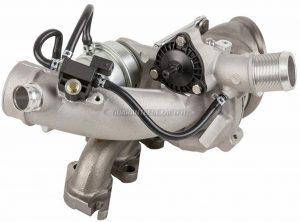Due to today’s strict fuel economy and emissions standards, most conventional vehicles are turbocharged. As this technology reaches affordable cars, turbo failure becomes more common as more vehicles are equipped with turbochargers and many of them are “everyday” budget and family cars compared to sports cars and luxuries. operate more than what they have for some time. This includes Chevrolet Cruze, Chevy Sonic, Chevy Trax and Buick Encore.
The problem with the Chevy Cruze turbocharger (available here) apparently centered on the optional 1.4L turbocharged engine (engine code LUJ). A non-turbo 1.8L is also available; The 1.4L generates more power and provides better fuel economy, but at the cost of greater complexity and, as time has shown, worse reliability. All 1.4T engine vehicles have these problems, but the Cruze is the best-selling engine vehicle and is the victim of most turbo failure cases.
The main cause of this problem is the turbo bypass valve or bleed valve. Similar to the Wastegate, this is a spring-loaded valve that releases pressure when the throttle is lifted and no longer requires a boost from the turbo. As time passes, the spring inside the valve weakens and progressively wears out as the valve closes. This keeps the valve open, saving speed, which means less speed goes to the engine. You will either notice the problem by the check engine light (diagnostic code P0299) on the dash, or you may notice that your vehicle generates less and less power over time.
Ideally, you can just replace the valve yourself as that is the main culprit, but there are two reasons why you can’t. The main reason is that the bypass valve is physically built into the turbo and cannot be taken apart. But even if it could, it would not be the best option for long-term reliability. Just as a stuck bypass valve can leak impulse, it can also let dirt and contaminants in. Many owners who are replacing their turbo because of a bypass valve problem have reported that the turbo center section is in very poor condition when removed. Since dirt entering the system is harmful to the center bearings when a turbocharger wheel can spin at 200,000 RPM.
When it comes time to replace your turbo, there are a few things you can do. Stay away from used turbos as there is no guarantee they will be in better shape than the one you replace. Rebuilt or rebuilt turbos are available, but they are not recommended. These are turbochargers that have failed before. The bypass valve spring will have been replaced, the center section cleaned, and new seals installed. This means an OEM replacement turbo, but there is no way to determine the quality of the parts used for a rebuild, and even if they are of OEM quality, it is not high praise; The original turbo is also not reliable.
GM released an updated version of this turbocharger in 2014 that also serves as an upgrade to the older models. The new quality aftermarket turbo will use this updated design and should last much longer than the original turbo at a much lower price than the dealer. You should not take your vehicle to the dealership to get the job done; As turbos become more common, trusted local independent mechanics will have no problem getting the job done, that too at a lower rate than a dealer. We also offer turbochargers from Stigan, which offer a two year warranty instead of the one year warranty in this industry. Stigan part number +1-419-404-8015 conforms to the following:
-2011-2017 Chevy Cruze 1.4T
-2012-2017 Chevy Sonic 1.4T
-2013-2020 Buick Encore
-2013-2017 Chevy Trax
-2016 Chevy Cruze Limited 1.4T If you’re still not sure what’s best for your vehicle, don’t hesitate to contact Grade Auto Part for specialized assistance in obtaining the best replacement turbocharger and other parts for your vehicle. We have guaranteed tight fit turbos from well-known brands such as BorgWarner, Garrett, Holset, Stigan and more.

